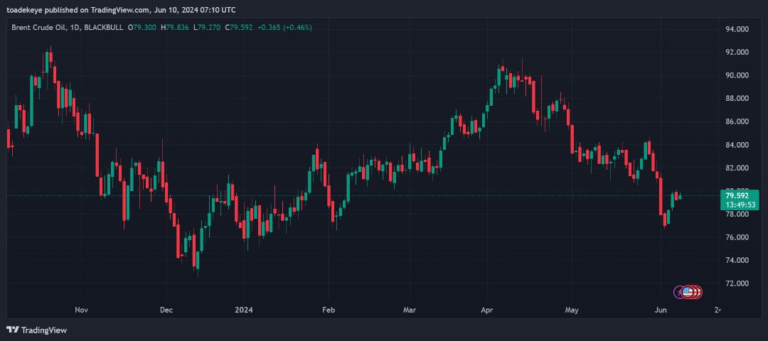Post Views:
35
Taiwo Adekeye, FMVA
Reasearch Analyst
Oil prices declined on Friday and posted a third straight weekly loss as investors weighed OPEC+ reassurances against the latest U.S. jobs data that lowered expectations that the Federal Reserve will cut interest rates soon. Brent crude futures declined by 25 cents hitting $79.62 a barrel, while U.S. West Texas Intermediate crude (WTI)declined by 2 cents to $75.53. High borrowing costs can slow economic activity and dampen demand for oil. However, the U.S. active oil rig count, an early indicator of future output, fell by four this week to 492, the lowest since January 2022. Conclusively, Crude fell for a third straight week on demand concerns, with Brent down 2.5% and WTI off 1.9%.
Strong US Jobs Data Spurs Global Stock Pullback Amid Rate Cut Uncertainty
Global stocks retreated from an all-time high on Friday after surprisingly strong U.S. monthly jobs data dimmed hopes that the Federal Reserve would soon follow euro zone and Canadian interest rate cuts, causing Treasury yields to shoot higher. However, The world’s largest economy added 272,000 jobs last month. Diminished hopes for a near-term Fed move weighed on stocks, which closed lower after a choppy session. The MSCI’s world share index dropped 0.3%, after touching a record high of 797.48 points.
Wall Street finished in the red. The S&P 500 (.SPX), fell 0.1% after hitting an all-time high of 5,375.08 points. The Dow Jones Industrial Average (.DJI), edged down 0.2%, and the Nasdaq Composite (.IXIC), also lost 0.2%.
Unemployment rate in Canada ticks to 6.2% in May
Canada’s unemployment rate rose to its highest level in over two years in May, while wage growth accelerated, presenting contrasting signals for the Bank of Canada’s upcoming rate decision in July. The unemployment rate increased to 6.2% from 6.1% in April. Conversely, average hourly wage growth for permanent employees surged to an annual rate of 5.2%, up from 4.8% in April. The uptick in unemployment suggests some strain on the economy due to high interest rates. However, the faster wage growth, particularly outpacing inflation, complicates efforts to curb consumer price hikes. Annual inflation stood at 2.7% in April.
Fidelity Bank’s Capital Expansion Drive: Rights Issue, Public Offering
Fidelity Bank Plc has finalized arrangements to raise a total of up to N127,100,000,000.00 through a Rights Issue to existing shareholders and a Public Offer. This initiative aligns with the bank’s strategy to bolster its share capital in compliance with the revised minimum capital requirements set by the Central Bank of Nigeria on 28th March 2024. Under the Rights Issue, 3,200,000,000 ordinary shares of 50 kobo each will be offered at a ratio of 1 new ordinary share for every 10 ordinary shares held as of 05 January 2024, priced at N9.25 per share. Additionally, the Public Offer will provide 10,000,000,000 ordinary shares of 50 kobo each to the general investing public at N9.75 per share.
Nigeria’s Trade Surplus Hits N6.52tr In Q1 2024
Nigeria’s foreign trade statistics report for Q1 2024 reveals a significant trade surplus of N6.52 trillion, marking a substantial recovery from the N1.41 trillion trade deficit recorded in the previous quarter (Q4 2023) and the N927.2 billion deficit in the same period (Q1) of 2023. Total exports for Q1 2024 were valued at N19.17 trillion, representing a 51.00% increase from the previous quarter’s N12.69 trillion and a 195.47% rise from N6.49 trillion recorded in Q1 2023. Major export commodities included crude oil, liquefied natural gas, sesamum seeds, urea, and superior-quality cocoa beans. Total imports for Q1 2024 stood at N12.64 trillion, reflecting a 39.65% increase from N9.05 trillion in Q4 2023 and a 95.53% rise from N6.47 trillion in Q1 2023. Key imported commodities included motor spirit ordinary, gas oil, durum wheat, cane sugar meant for sugar refinery, and other liquefied petroleum gases.








